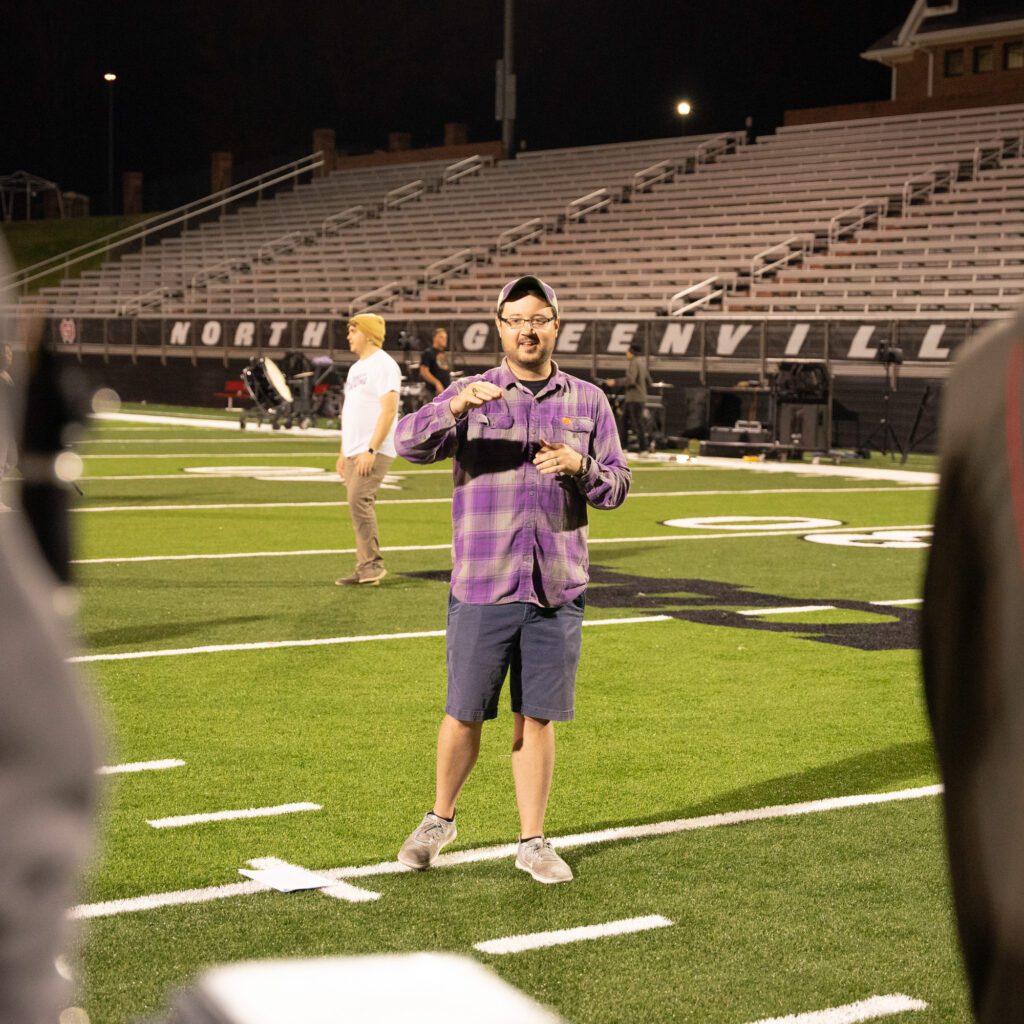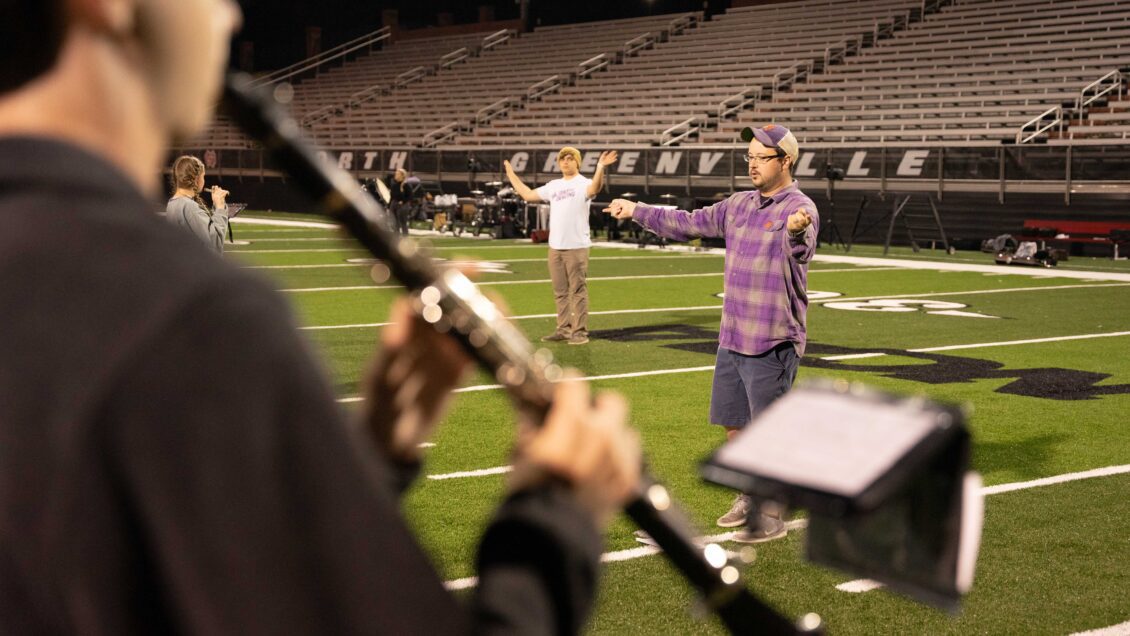Gary Rhoden is the first to admit that he has taken “the scenic route” to a Ph.D.; when he started the educational leadership program in Clemson’s College of Education, his five-year-old daughter had not yet been born. However, he said one of the many great things about the program is the faculty’s willingness to work with its students, and they have worked around Rhoden’s hectic schedule as director of athletic bands and coordinator of music education at North Greenville University.
Rhoden said a band director may not be the first person many would think of to take advantage of a graduate educational leadership degree, but he has seen the ways a Ph.D. can positively affect his day-to-day work in higher education and how it is preparing him for the next stage of his career. We caught up with Rhoden to discuss what life as a band director is like, how a musical upbringing set his course for it, and how musical instruments–and their effects–have figured into his dissertation.
Why pursue a Ph.D. from Clemson?
My undergraduate degree is in music education. I have a master’s degree in music education, and I also have a master’s degree in educational leadership and school leadership from Furman University. A Ph.D. opens up more opportunities and doors for me to pursue later.
I chose Clemson because, frankly, I had always heard it’s a tough program, and I’m one of those people who wants the full-on experience. I went to Clemson knowing it was going to be a long road, and it’s been very rewarding.

Tell us about your dissertation.
My dissertation is titled “Can You Hear Me Now?” and it’s an educational policy change study using improvement science as a methodology. There’s a problem with hearing loss in music classrooms because the sounds are often too loud. I’m using band directors as my sample and my population.
If I tell teachers about an issue with sound in their classrooms or noise-induced hearing loss for the teachers and their students, we may need to revisit this policy. I’m basically asking, “How do we change things in schools, and once you’ve seen a change that needs to be made or a policy that needs revisiting, what gives teachers an active voice in that process?” I am looking at the roadblocks along the way and what can alleviate those issues. I think it is similar to lead in drinking fountains or helmets or heat-related safety for athletes. When a problem presents itself, and we have enough science, what can we do to actively get that policy change in classrooms?
I’ve learned that it’s more than just knowing what the problem is in your classroom and knowing the science and the research behind it. It’s more about working with administration and working with your school-level and district-level administrators to outline the issue that involves students and the need to remedy that in class classrooms.
What have you enjoyed about your Ph.D. program?
It gives me an opportunity to understand the world of research and how I can add to academic studies. It’s teaching me how to do research, what that process looks like and why it’s important. That’s been really eye-opening for me as far as the world of academia goes.
I have had great faculty members and wonderful classes, and I’ve really appreciated those on my committee. They’ve been very invested in me and put their time into what I’m doing; they also understand I’m a working professional, and they meet me where I am and support me in a way that’s going to get me across the finish line. I’ve really enjoyed classes with Dr. Natasha Croom; her courses have been a big asset for me and have given me a different perspective to think about not only as a scholar but as a teacher.

What has surprised you about the Ph.D. program?
I did my undergrad at Furman University, and I got my first master’s degree at Furman. I got my second master’s degree at North Greenville University. Being part of a larger university at Clemson is very different than what I’ve experienced before, which is cool. It’s something that gave me a different perspective on how students experience college and how students experience a university. I think the coolest thing is just being part of a big university with a lot of rich history, and I’ve got family members with degrees from Clemson, and I’m excited to join the club.
It’s been really neat to experience the big university feel and to get on campus from time to time. When I started taking classes, we still met on campus and sometimes at the University Center Greenville. My classes moved online during COVID-19, but it was great getting to take those classes in person.
What tips would you give to a person pursuing a Ph.D. in general?
I think it’s really important to remember that it’s a marathon and not a sprint. You take things as they come to you, you do well with the things that are in front of you and you just take it one day at a time. Keep the goals ahead of you, and realize there’s a reason you’re putting in this extra work late at night after you put your kids down after work. Remember why you’re doing this, and try not to bite off more than you can chew.
What inspired you to be a band director?
My mom and my mom’s mom were always very, very musical; my mom’s side of the family was very much to blame for all of this (laughs). But when I was in high school, the band was an activity and a thing for me to be a part of that really kept me coming back to school. I was never going to drop out, but I woke up each day thinking, “All right, if I can make it to third period, I’ve at least got something I’m looking forward to today.” Music also came naturally to me, and I enjoyed being a part of a big program with people who had common goals. I hope my high school teachers don’t hear this and cringe.
I wanted to be a band director to share that experience with my students. I wanted them to have a reason to come to high school, have a reason to want to be excellent at something. This is my 14th year teaching. Even if, over all that time, I just got one student through high school or one student through college because of a program I led, it was worth it.
Get in touch and we will connect you with the author or another expert.
Or email us at news@clemson.edu

